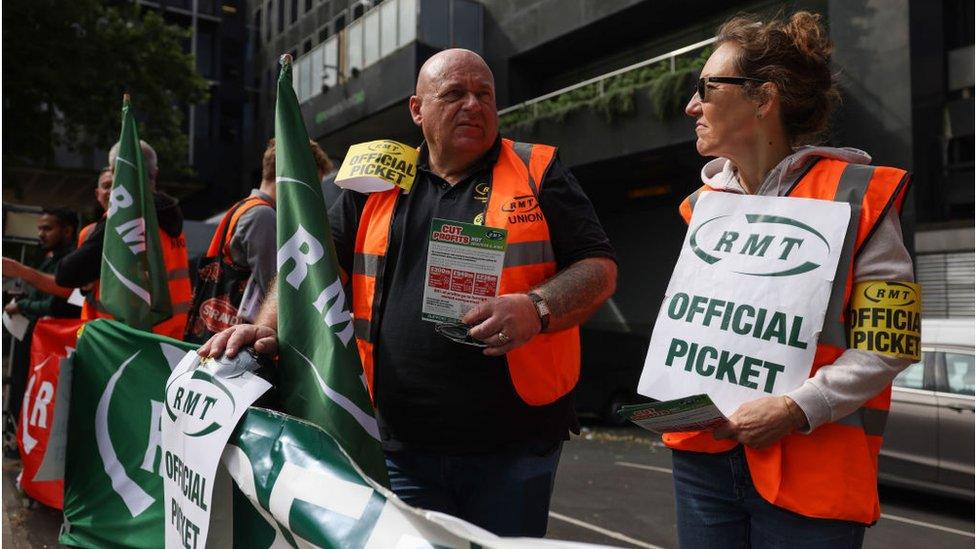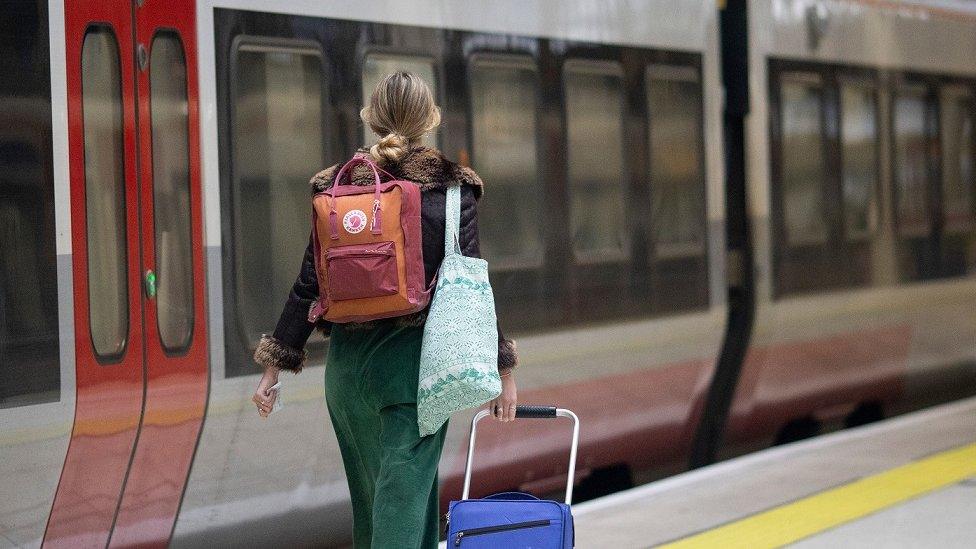Rail strikes cynically targeting Eurovision, transport minister says
- Published
Watch: Strikes should be not be targeting Eurovision, says Mark Harper
Transport Secretary Mark Harper has accused the RMT transport union of "cynically targeting the Eurovision song contest" by calling strikes on the day of the final.
RMT members are due to strike on 13 May after the union rejected the latest pay deal from train operators.
The RMT said the Rail Delivery Group (RDG), which represents the train operators, had "torpedoed" pay talks.
But Mr Harper said a "fair and reasonable pay offer" had been made.
In an interview on the Sunday with Laura Kuenssberg programme, Mr Harper urged the RMT - the UK's largest specialist transport union - to put the pay offer to its members and let them decide.
Mr Harper said, rather than doing this, the RMT had "called strikes which are cynically targeting the Eurovision song contest".
"The reason that's so appalling is because that's not our song contest," Mr Harper said. "We're hosting it for Ukraine."
Mr Harper said the RMT should be standing "in solidarity" with Ukrainian rail workers targeted by Russian President Vladimir Putin in war-torn Ukraine.
The BBC asked the RMT if it wished to comment but the union said it had nothing to add beyond its previous statements.
The RMT union said it would launch action across 14 train operators for 24 hours on Saturday 13 May - the day Liverpool hosts the Eurovision final on behalf of Ukraine.
Members will be walking out from 00:01 to 23:59 BST on 13 May.
The union's executive and the train operators had been discussing a new pay offer aimed at ending a long-running dispute.
The RDG's proposals involved one year's pay rise of 5% that was dependent on the union agreeing to go into a "dispute resolution process" and accepting the general principle of changes to working practices.
Earlier this week, RMT general secretary Mick Lynch said the RDG had "reneged on their original proposals and torpedoed these negotiations".
Train operators said they had been "blindsided" by the strike, and denied union claims they had changed their offer.
Steve Montgomery, chair of the RDG Group, said the union was "negotiating in bad faith, again denying their members a say on a fair pay deal, needlessly disrupting the lives of millions of our passengers, and undermining the viability of an industry critical to Britain's economy".
The RMT's decision to take industrial action followed the announcement of strikes by Aslef, a union that represents train drivers.
Aslef has strikes on 12 and 31 May, and on 3 June, the day of the FA Cup Final at Wembley Stadium in London. The strikes will run from 00:01 to 23:59 each day.
The union rejected a fresh offer from 16 train firms, including a 4% pay rise for two years in a row and changes to conditions.
Mick Whelan, Aslef's general secretary, said the offer was "risible" and "clearly not designed to be accepted as inflation is still running north of 10%".
The only people responsible for the ongoing strikes in this country "are the government and the employers", he told the BBC.
On the Sunday with Laura Kuenssberg programme, Mr Harper was asked whether the government was prepared to let rail strikes disrupt the industry until Christmas.
He did not answer the question directly, but said: "In the end, the people who work in those industries have got to make a judgement about whether they accept the pay offer."
"All that the rail unions are going to do is drive people away from it," he said. "Take the two biggest events they're trying to disrupt, Eurovision and the FA Cup Final."
Mr Harper predicted the bus and coach sector would "step up" on the days of planned rail strikes in May and June.

How will you be affected by the rail strikes? haveyoursay@bbc.co.uk, external.
Please include a contact number if you are willing to speak to a BBC journalist. You can also get in touch in the following ways:
WhatsApp: +44 7756 165803
Tweet: @BBC_HaveYourSay, external
Please read our terms & conditions and privacy policy
If you are reading this page and can't see the form you will need to visit the mobile version of the BBC website to submit your question or comment or you can email us at HaveYourSay@bbc.co.uk, external. Please include your name, age and location with any submission.
Related topics
- Published27 April 2023

- Published27 April 2023

- Published28 April 2023
